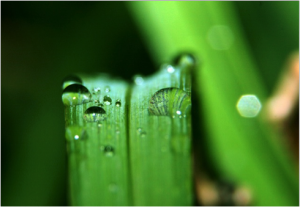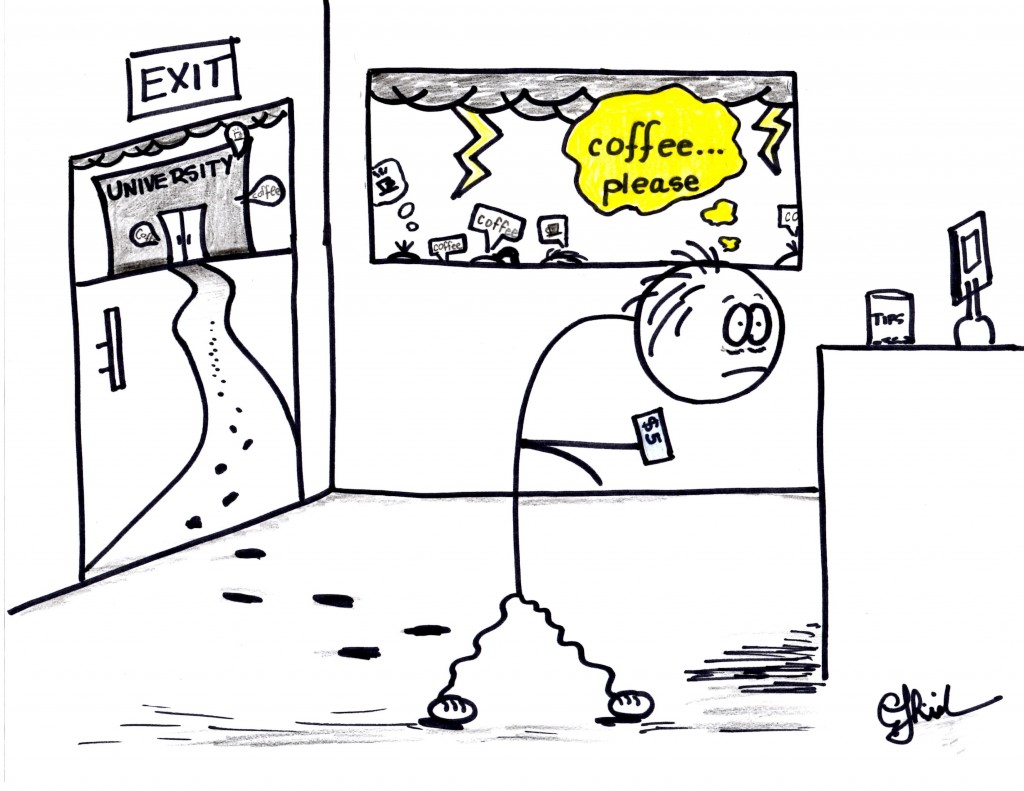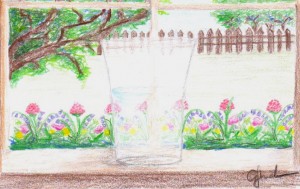Imagine this:
Your alarm goes off. You pat around to find the source of that annoying beep. You press some buttons until you hit the right one: SNOOZE. Ahhh, silence, you think. Just 10 more minutes. Just 10….
You’ve pressed snooze for long enough now that you have no choice but to get out of bed. You scramble to get dressed, shove some food in your face (maybe not), throw some food in a bag for lunch (also maybe not), and hopefully brush your teeth before you scramble out the door. You didn’t have a chance to make coffee at home, but you might be able to grab a quick cup to go on your way to rehearsal.
You show up just a few minutes late, but with coffee in hand. The rehearsing starts. Your concentration is foggy, and your eyes don’t seem to be focusing on the notes in front of you. Is my coffee working? you ask yourself.
The day continues, along with practicing, rehearsals, classes and meetings. By the time evening comes around, you feel like you haven’t woken up all day. Life should be like this, you think. If only there was a way I could actually concentrate…

Water. We Need It.
We need water to survive. We can’t last without it for more than a few days. The majority of our body weight is made up of water, ranging somewhere between 45-75%, depending on the individual (Benelam & Wyness, 2010). In our bodies, water acts as a building material, as a carrier for both nutrients and wastes, and as a shock absorber, and it also helps regulate our body temperature (Jéquier & Constant, 2009). But apart from water being essential to how our physical body works, it also plays a vital role in how we perform mentally.
Dehydration.
If we become mildly dehydrated (that is, if we lose between 1-2% of our body weight), we may experience headaches, fatigue, and reduced physical and mental performance. On average we lose between 2-3 litres of water per day: it evaporates through our skin and respiratory system, we perspire, and we excrete wastes (Jéquier & Constant, 2009).
In terms of cognitive functioning, being even mildly dehydrated can affect our concentration, alertness, and short-term memory functions. In a review titled “Water, Hydration and Health,” Popkin, D’Anci, and Rosenberg (2010) propose that experiencing mild dehydration could be “a physiological stressor which competes with and draws attention from cognitive processes.” This might be one idea, but the authors themselves admit that more research still needs to be done to support this hypothesis.
So, the big question remains, how much water should we drink? Suggestions like “6-8 glasses/day” might be familiar to a lot of people. Other ideas might sound like, “well, if we’re losing 2-3 litres per day, we should be consuming 2-3 litres to balance it out.” While it is true that drinking plain water is an important way to satisfy our bodies’ water intake requirements, we can also absorb the water found in other beverages such as juice or tea, and even from our food. How much water we should actually consume to achieve adequate hydration levels depends on a variety of factors like climate, amount of physical activity, age, body size and diet. These factors make it nearly impossible to give specific intake recommendations that work for everyone.
“Man, I Really Need a Coffee…”
Why water might be a better choice in the long run.

It’s so easy to grab a coffee for a quick fix to keep us going throughout the day, especially through the demands of university life, and the go-go-go mentality of today’s society in general. Moderate caffeine consumption (ranging somewhere between 38-400mg/day) can improve physical endurance, cognitive function, especially alertness and vigilance, mood, and our perception of fatigue (Ruxton, 2008).
Even though coffee isn’t ALL bad, are we also willing to consider the negative effects of caffeine intake before we desperately run over to Starbucks? A chapter on caffeine is interestingly found in the Encyclopedia of Substance Abuse Prevention, Treatment & Recovery. It states that “caffeine is not a nutrient that the body requires for optimal healthy functioning. Rather, it belongs to the class of drugs popularly called central nervous system stimulants due to their ability to heighten physical and psychological functioning.”
Even within the range of moderate consumption, caffeine can cause sleep disturbances and increased blood pressure. Higher doses of caffeine can even “produce anxiety, jitteriness, stomach pain, diarrhea, dehydration, dizziness, rapid heart beat, blurred vision, severe confusion (delirium), muscle tremors, nausea, vomiting, increased sensitivity to touch and pain, seizures, and decreased bone density” (Bedi & Wuitchik, 2009)
These side effects may sound extreme, and perhaps they are, but it does segue into the next topic of conversation: why water might be the better choice to increase our cognitive functioning.
There are a number of studies and reviews that report proper levels of hydration having a positive affect on mental performance. “Does having a drink?” tested this in 6-7 year old children and found that those given a glass of water before performing a task performed those tasks better than children who didn’t drink water first. The children who drank water showed increases in their moods and happiness ratings, and their visual attention and visual search abilities were also positively affected (Edmonds & Jeffes, 2009). To further these results, a review by D’Anci stated that individuals who were adequately hydrated reported feeling more alert.
So what does all of this mean for musicians? With adequate hydration and increased alertness, mood and attention, we might be able to focus better during a performance. We might be able to make smarter choices in the practice room, and use our time more efficiently. We might even gain the perception of seeing our music notes more clearly.
The big question we should be considering is why we rely on caffeine to combat fatigue in the first place. If we don’t NEED it to function healthily and optimally, why do we consume it? A glass of water won’t necessarily keep us alert and “alive” after 4 hours of sleep the night before a big concert. What we need to do is find our own balance within a completely healthy lifestyle.
Are we sleeping enough? Are we eating a good balance of healthy foods? Are we exercising regularly?
Should I convince my students to drink water?

Here’s the thing. Younger kids are more affected by smaller levels of dehydration than adults are. So, if you’re a music teacher who values the wellbeing of your students outside of your studio, it’s really important to understand that healthy habits start early on. It’s similar to learning a scale with good technique right from the start, instead of trying to fix the bad habits your students accumulate over time.
It’s important to instill values of overall health and wellbeing (including hydration, sleep, exercise and good nutrition) so that as your students get older they are equipped with the information and the knowledge to continue healthy lifestyle choices as they reach young-adulthood, university life and beyond.
Our job as teachers is to build up a healthy generation of musicians, and it starts with our students. It doesn’t matter whether we offer them a glass of water or a cup of tea before a lesson, or integrate topics of sleep or growing vegetables into the conversation while turning to the next page of music. What matters is that we care for each one of our students in a complete and wholistic way. It doesn’t take much to truly make a difference.
References:
- Bedi, R. P., & Wuitchik, N. G. (2009). Caffeine. In Encyclopedia of Substance Abuse Prevention, Treatment, & Recovery, 1: 151-152. Retrieved from http://go.galegroup.com.proxy3.library.mcgill.ca/ps/dispBasicSearch.do?prodId=GVRL&userGroupName=crepuq_mcgill
- Benelam, B. and Wyness, L. (2010), Hydration and health: a review. Nutrition Bulletin, 35: 3–25. doi: 10.1111/j.1467-3010.2009.01795.x
- Benton, D. (2011). Lifetime nutritional influences on cognition, behaviour, and psychiatric illness. Oxford: Woodhead Pub.
- Edmonds, C. J., Jeffes, B. (2009). Does having a drink help you think? 6-7-year-old children show improvement in cognitive performance from baseline to test after having a drink of water. Appetite, 53(3): 469-472. doi:10.1016/j.appet.2009.10.002
- Jéquier, E. & Constant, F. (2009). Water as an essential nutrient: the physiological basis of hydration. European Journal of Clinical Nutrition, 64, 115–123. doi:10.1038/ejcn.2009.111
- Ruxton, C. H. S. (2008), The impact of caffeine on mood, cognitive function, performance and hydration: a review of benefits and risks. Nutrition Bulletin, 33: 15–25. doi: 10.1111/j.1467-3010.2007.00665.x
- Popkin, B. M., D’Anci, K. E., & Rosenberg, I. H. (2010). Water, Hydration and Health. Nutrition Reviews, 68(8), 439–458. doi:10.1111/j.1753-4887.2010.00304.x
Media:
- Photo “Grass Nature Drop” by Rony Michaud, sourced through creativecommons.org
- Drawings by Gabriele Thielmann

Interesting and fun presentation of super relevant information!!! Thank you!
Thanks M!
Coffee!? Listed in as a drug!!?? Noooooooo!!!! But it tastes sooo good!… I’m gonna try to focus on staying hydrated for sure… and then we’ll see about the rest…
Thanks for the heads up though, Music Performance and Body Seminar.
Believe me, RMJ, I was just as shocked as you were to find out that it is considered a drug. Kind of funny though. It’s hard to “stop” things that we really enjoy, especially if they come with social elements or personal enjoyment, like drinking coffee in a cafe, for example. Sometimes we can’t give those things up for whatever reason, but it’s good to stay focused on what we can change!
When people, especially students like myself, are feeling tired, the first thing they reach out for is coffee to get that quick boost. But what if they stopped and thought about long term consequences such as becoming reliant or progressively needing more and more caffeine to get the desired effects? If individuals are mindful of keeping themselves hydrated with water, they would probably think twice about getting that third cup of coffee while seeing much more of the benefits mentioned above in the long run!
Good point, Jen Lee, I agree. Maybe we can’t change the demands our society puts on us, or the expectations of university, but if we can understand the benefits of hydration and act on them, we might see an increase in health or even just in how individuals cope with the stress of societal demands.
It is very convincing! I also love the cartoon that shows how poor my dehydrated self is.
I think distribution of times of dringking water could be important to have a desirable effect. i keep forgetting to drink water and if I drink 6 glasses of water at once at night that will be disastrous 😉
Increasing awareness or sensitivity to the feeling of thirst could be a good strategy to responsively drink water when our body needs it. But I don’t know how to improve it. Should I just set 6 alarms to drink water?
Thanks for your comment, KC. It is hard to know how to improve these things! It might take a certain amount of “trial and error” to find the best way to hydrate our bodies. I think we should be willing to explore different solutions and see what works for us. Maybe an alarm isn’t a bad idea, if it’s a constructive reminder 😉
Water…it’s a necessity. I like the connection to water in musical performance, because even though we have all heard about the benefits of water, the truth is, the more information there is, people will be more inclined to act on it as they become more exposed. I also like the cartoon picture 🙂
It’s true – education and inform-ation is key!
I have a hard time waking up in the morning (maybe going to bed too late has something to do with that) but the alarm still always goes at the same time and works still starts at 8:00 a.m.so I never have the luxury of sleeping in to compensate for my late nights. Someone in my house is always up before me and brings me coffee in bed!! to help my get my day started (spoiled, I know!!!). I love the smell of coffee and I enjoy the taste also but a few years ago, I found I was drinking too much (about 3 – 5 cups a day) so I decided not to join the coffee pool at work to purposefully limit my intake during the day. I was thinking that I would drink water instead, which was/is a great idea and something I know that I should do, but I really have to seem to consciously think about reaching for a glass. I’m not quite sure why that’s so hard but I really have to work to do that. This information is a good reminder to “get with the program” and do what I know I should do even when/if I don’t feel like it.
Thanks for sharing, Ruby. I think the best we can do is try to remind ourselves that changes like drinking water, going to bed earlier, or exercising more are not actually that hard to do. It’s difficult to find the necessary motivation sometimes though! Maybe you could try KC’s suggestion: setting an alarm throughout the day as a drink-water reminder 😉
This is really informative! I tend to congratulate myself on not relying on caffeine to function in the morning, but I often find my concentration lagging when I’m thirsty, and trying to practise. This post motivates me to remain hydrated.
That’s great news, RR! Glad you found this post motivating.
Loved the drawing. Especially the shaky legs. I’m going to take my water intake more seriously after reading this. I might even avoid the extra cup of coffee. Maybe…
I don’t drink tea or coffee, but after reading your article, I realize I don’t drink fluids as frequently as I should. I tend to drink 8+ bottles of water when I’m sick but otherwise, I drink maybe 1 cup a day. I didn’t realize that fluids could help with my practicing so I am definitely going to up my intake of fluids! Thanks for the share, Gabriele!
Good point about water helping with practising. There is no better feeling than being focused and mentally productive.